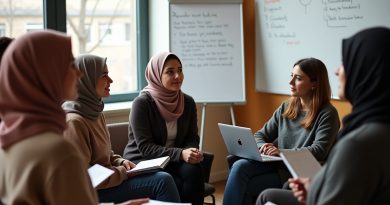The Role of Muslim Intellectuals in Building Indonesian Intellectualism

By Dr. Abdul Wadud Nafis, LC., MEI
The development of intellectualism in Indonesia cannot be separated from the important role played by Muslim intellectuals. They are not only thinkers and educators but also agents of change who contribute to spreading knowledge and religious values. In the long history of Islamic civilization in the archipelago, Muslim intellectuals have been the driving force striving to harmonize modern knowledge with Islamic teachings, integrating both into all aspects of societal life. Through their various roles, Muslim intellectuals have built a strong intellectual foundation that continues to evolve today.
In the plural and dynamic context of Indonesia, Muslim intellectuals have a great responsibility to encourage critical thinking, provide moral guidance, and lead in the dissemination of knowledge relevant to the times. Their role spans various fields, from education and politics to social development, aiming to shape a civilized, broad-minded society rooted in Islamic values. Thus, Muslim intellectuals serve as both the guardians and drivers of sustained intellectual progress in Indonesia.
Muslim intellectuals play a highly significant role in developing intellectualism in Indonesia. Below are some of their key roles:
1. Dissemination of Knowledge: Muslim intellectuals play a role in spreading knowledge based on Islamic teachings and general knowledge. They establish educational institutions, such as pesantren, madrasahs, and universities, that integrate religious values with modern knowledge.
2. Empowering Critical Thinking:
Through writings, discussions, and lectures, Muslim intellectuals encourage critical thinking in society. They teach rational thinking methods that rely not only on tradition but also on deep analysis in line with contemporary contexts.
3. Development of Islamic Thought:
Muslim intellectuals contribute to reformulating and renewing Islamic thought, ensuring that religious teachings remain relevant to contemporary challenges. They are often involved in Islamic reform movements (tajdid), linking Islamic teachings with modern issues such as economics, politics, and technology.
4. Promoting Moderation Values:
Muslim intellectuals in Indonesia often lead in spreading the values of moderation (wasathiyah) in religious and social life. They promote a tolerant and inclusive Islam that can coexist with the diverse religions and cultures in Indonesia.
5. Providing Constructive Public Discourse: They are often engaged in important public debates, such as political, economic, and social issues, offering relevant and progressive Islamic perspectives. This helps society understand and respond to the challenges of globalization and modernization.
6. Social and Moral Leadership:
Muslim intellectuals are not only scholars but also moral leaders who set an example in ethical and religious behavior. They play a crucial role in educating the younger generation to become individuals with strong character and broad vision.
7. Collaboration with State Institutions:
Many Muslim intellectuals are involved in government and state institutions to formulate policies based on the values of social justice and humanity in line with Islamic teachings. They also support educational policies that create a strong intellectual generation in Indonesia.
Through these roles, Muslim intellectuals in Indonesia serve as vital pillars in shaping intellectualism that balances modern science and religious values. Muslim intellectuals not only disseminate knowledge but also integrate Islamic values with modern thought. Through education, moral guidance, and active involvement in social issues, they drive intellectual and social progress relevant to contemporary challenges. They promote critical thinking, religious moderation, and the renewal of Islamic thought, making them essential pillars in building a broad-minded and strong-charactered generation.
References
1. Alatas, Syed Hussein. Cendekiawan dan Peranan Mereka dalam Masyarakat. Jakarta: LP3ES, 1987.
2. Abdurrahman, Moeslim. Paradigma Intelektual Muslim: Pengantar Kajian Islam dan Sosial. Jakarta: Mizan, 1990.
3. Azra, Azyumardi. Jaringan Ulama: Timur Tengah dan Kepulauan Nusantara Abad XVII dan XVIII. Jakarta: Kencana, 2007.
4. Kuntowijoyo. Muslim tanpa Masjid: Esai-Esai Agama, Budaya, dan Politik dalam Bingkai Strukturalisme Transendental. Bandung: Mizan, 2001.
5. Rahman, Fazlur. Islam and Modernity: Transformation of an Intellectual Tradition. Chicago: University of Chicago Press, 1982.
6. Qodir, Zuly. Gerakan Islam Kultural: Pergulatan Pemikiran Islam, Masyarakat Madani, dan Demokrasi. Yogyakarta: Pustaka Pelajar, 2015.
7. Madjid, Nurcholish. Islam, Kemodernan dan Keindonesiaan. Bandung: Mizan, 1991.
8. Heryanto, Ariel. Islam, Intelektualisme, dan Politik. Yogyakarta: Pustaka Pelajar, 1999.


